Europa, an ordinary laying hen
...with a very special life.
Or, is it really wise to adopt an ex-batteryhen?
Every day in this world many millions of chicks are born for the egg industry. The males disappear into a shreader, are gassed or are simply thrown into a trash can where they suffocate. The females are vaccinated if they are lucky and, depending on their destination, their beak may be trimmed. Then they are raised for a while in a shed or in cages, also depending on where they end up, either in a battery farm or as a free-range chicken. However, don't be fooled, free-range chickens do not always go outside, but may be raised in a large covered barn. The laying battery hens have it the worst, even though now in Europe they are no longer alone or three in a cage, but in a large cage, with nesting possibilities (a mat), a perch and somewhat more space. But it is still a tragedy for these chickens.
It's a fact that these chickens have been bred over the years to lay a lot of eggs. Almost one egg every day. That is not at all normal for a chicken. The predecessor of the commercial chicken was the Red Junglefowl, a very small chicken the size of our little Henrietta (sebright), and they only lay around 10 eggs a year, enough to ensure sufficient offspring and let's face it, 10 chicks is already enough to take care of as a chicken in the Asian bush. So the chickens like Europa lay an egg almost every day, around 300 a year.
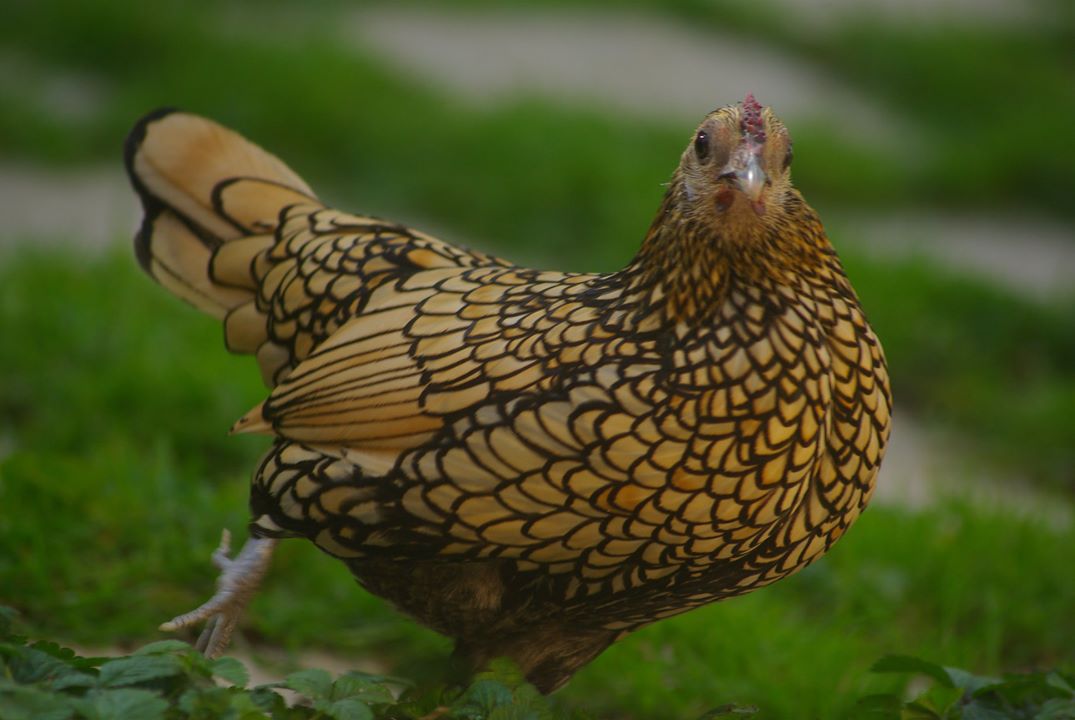
Henrietta
Laying so many takes its toll. The chances are that eventually something will go wrong with the laying system. But most laying hens don't live that long. After only a year and a half they are renewed or replaced by young chickens. The older chickens, in English, are called "spent" hens and in French they are called "poules de réforme" (i.e. renewal , in other words the chicken gets a different destination, namely chicken soup or cat / dog food), go to slaughter. Nowadays there are a lot of charity organisations that want to save these ex-layinghens and so you can adopt or buy a chicken.
We are not in favour of that. Why not?
Of course it is a very nice idea to save such a chicken from slaughter. But isn't it the intention to eventually get rid of this terrible industry? Chickens have it the worst in these factory farms. The farmer looks down on chickens. I once talked to a chicken farmer about his chickens, and he said that chickens are stupid, because there is no room for brains in such a small head. Fortunately, we know a lot more about chickens today than in the past. But if you do buy chickens from such a farmer, he will earn a lot from it. Here in France they ask 2.5 euros per chicken. At slaughter, he gets almost nothing for one. So the sale of these laying hens is a lucrative business for the farmer who happily carries on with his "business as usual", exploiting chickens for their eggs.
But suppose you take some of these chickens home with you. Usually they look very bad in the beginning and then it is wonderful to see how they develop further, how they enjoy freedom and good care, at least when they get it and how beautiful they look after a while. And you saved a chicken. But as I said, there is a problem with such a chicken at some point. The least harmful conditions such as coccidiosis, worms, lice / mites, etc. are easy to cure. And many infections too. But there are a number of terrible illnesses that cannot be cured. And the problem is that many vets often do not have enough knowledge to distinguish between different diseases and can't even do for blood tests, for example, because it's just never done and thus there are no references against which they can measure the results of a blood test, so they are often just guessing. The only thing they can really use for a diagnosis is an autopsy, but you can't cure your chicken with that ....
And now I come to Europa.
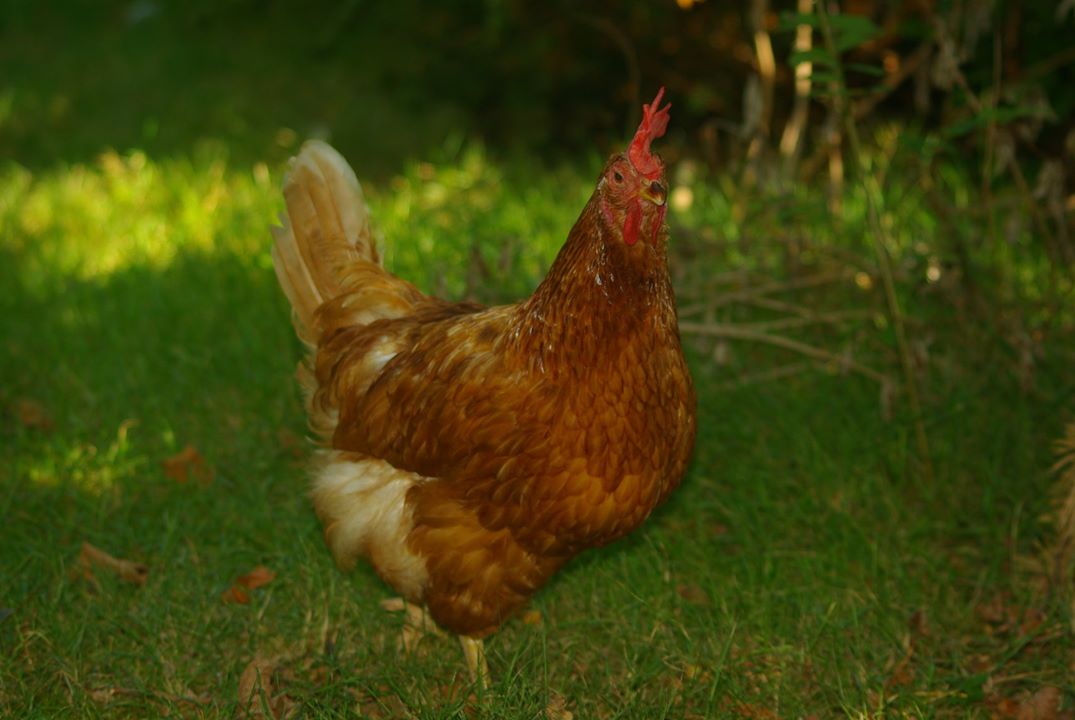
Europa
Europa was found in the middle of a deserted field in France, on 9 May 2018, the day of the European Union. Hence her name. So we know nothing about her origins, but what we do know is that she is from a typical laying breed. Europe has never actually laid an egg here with us. Yes, every now and then she sat on the nest and every now and then a sort of membrane came halfway out which I had to pull out the rest of the way but she hadn't done this for a long time.
Now Europa became seriously ill at the beginning of February. She had terrible diarrhea and did not want to eat. After having had about 90 chickens and having treated a lot of illnesses, I try the obvious solutions, such as deworming first, antibiotics / probiotics, because chickens can have "gastric flu" just like humans. And luckily she got better afterwards.
She just went back to scratching around as usual, but a few weeks later she was ill once again. So more antibiotics and again it got better. We went on like this a number of times, until the moment came when we said, "Now we really must go to the vet". I must honestly say that I start to do so more and more reluctantly, because most of the time you come home with the answer, we don't really know what it is or we know but there is nothing to be done (operating is often a risky business), and then they give you some vitamin preparations that don't really work. It was already clear to us that Europe's illness had to do with not being able to lay, with the fact that strange pieces appeared from her cloaca when she wanted to lay and that there was some kind of rhythm in her illness. It went up and down and not linearly down as often happens when a chicken is incurably ill and eventually dies. Anyway, all this was of course complete speculation. That is why you also go to a vet to provide certainty about a possible diagnosis.
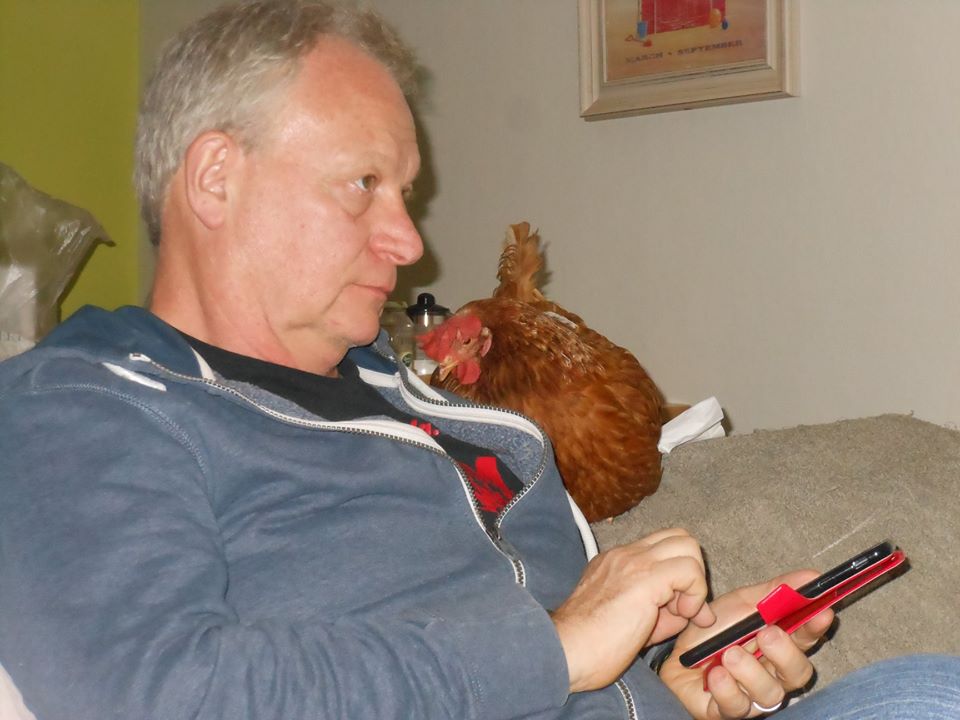
Family visit with Europa
An ultrasound scan was made during the first appointment at the vet. For us it's mostly magical interpretation of what you see on the screen but the vet seems to be able to make something out. She says she has seen an egg and gives her an injection to allow that egg to come out first. The next week we have to come back for an implant, which is what we had asked for. If a chicken has laying problems, you can stop it with a Suprelorin implant (a type of chemical sterilisation that has been developed for carnivores, i.e. ferrets, dogs and cats, but that also works to stop the laying system of the chicken). On this webpage you can read more about it. But you have to wait until the chicken is healthy and fit. And fortunately Europa had completely recovered after her last crisis.
At the second appointment we had another veterinarian, the owner of the practice. And she also made an ultrasound scan but she said, "No, this is a tumour on the liver." Well, that is not really such a crazy conclusion because we have also had to deal with a disease, Marek's disease, which causes chickens to get tumours. Marek persists in the chicken house for a long time. Many of our chickens have died from that disease. We had taken along a sample of something that had come out of Europa to show her, but she just threw it in the rubbish bin without even opening the container. "I can't use it," she declared. And so she refused to do anything else: no implant. With a tumour, it is often only a matter of waiting for the chicken to start to fade away before it is finally put to sleep. Well, you have to have faith in your vet, especially one who is married to a poultry doctor who works for the poultry industry, and so we went home with another bottle of vitamins (as usual). In the meantime, more and more pieces of the same sort of stuff are coming out of Europa. We are worried, because a tumour on the liver really does not present itself through stuff coming out of the cloaca!
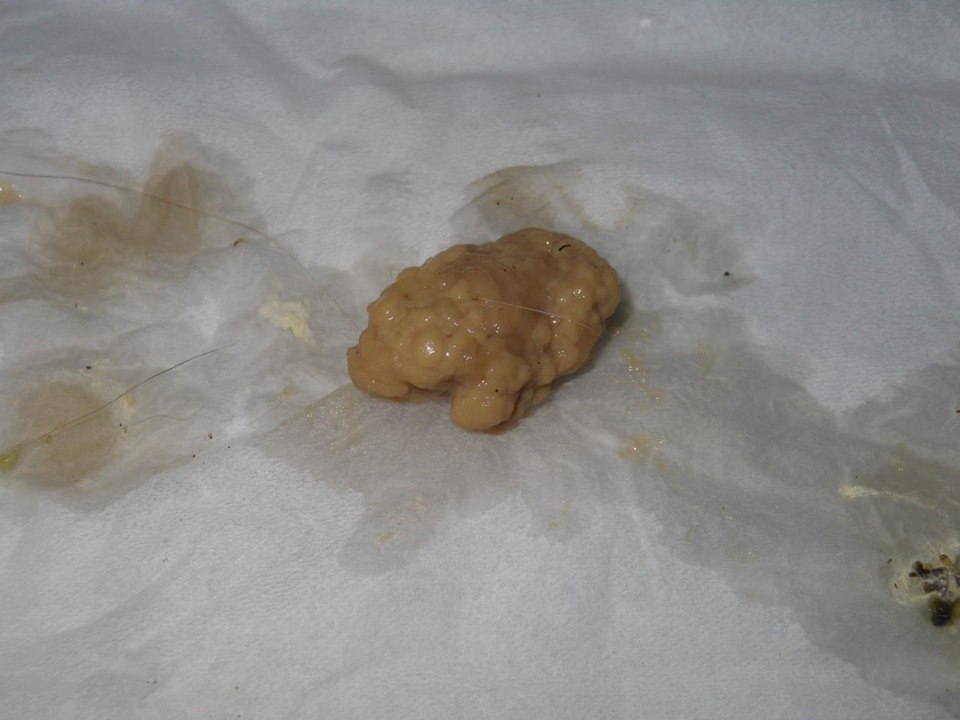
Piece of a cyst coming out of the oviduct
So we took some more pieces of this stuff to her husband's lab and there we were told that it was definitely a laying problem. But now Europa is becoming weaker. At the very last possible moment that we had thought we could still save her and have an implant placed (we know from our vet that she doesn't like to do it at all), nothing was done. And so it was now too late for Europa. Europa finally passed away peacefully at our home on Easter Sunday.
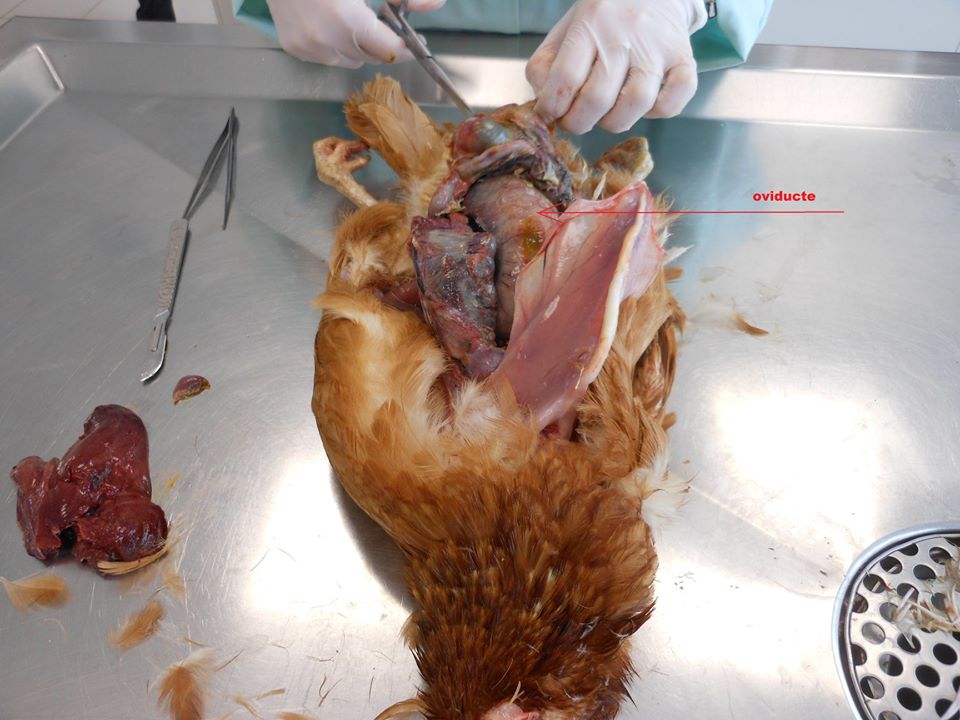
Of course we were curious as to what really caused Europa's disease. Yesterday we had an autopsy at the lab. The heart, liver, gizzard and spleen were good. But the oviduct was way too thick and that indicates that there was a blockage in it. The cause was an infection in the oviduct, according to the autopsy report that we have just received. In addition to this thick oviduct, there was another cyst. So this whole mass, of course, has badly obstructed the digestion of the chicken, resulting in diarrhea, not wanting to eat anymore and so she was very thin at the end. More photos of the autopsy can be seen on this page:https://www.facebook.com/nala.bournezeau/media_set?set=a.2175871092494039&type=3
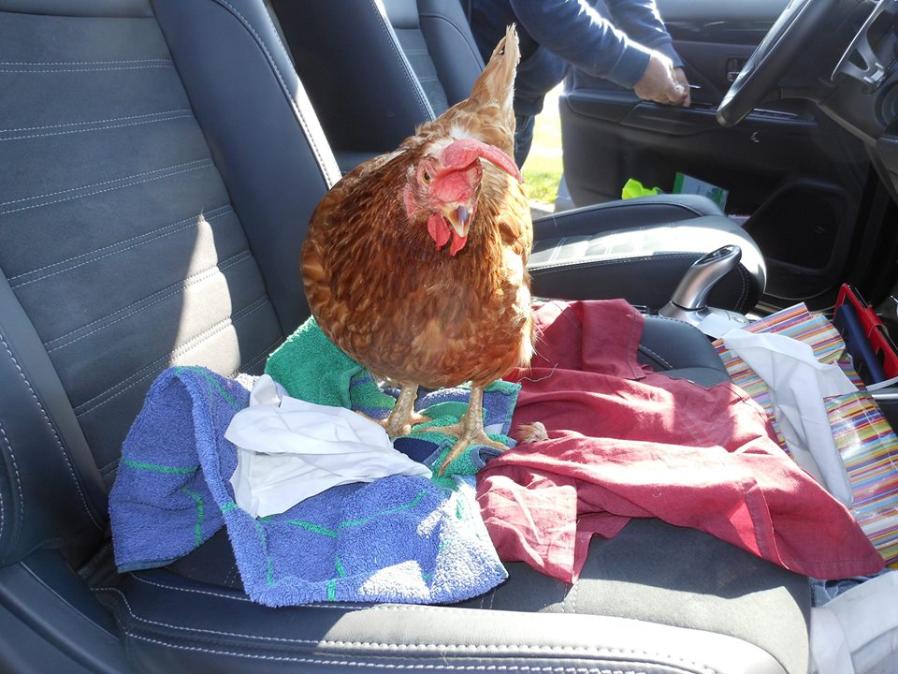
Europa in the car
What is the moral of this story? We went to extremes trying to take care of Europa. She even came with us when we went to visit relatives abroad as we didn't want to leave her behind while she was ill. We think this is normal. You take good care of an animal that is sick whether it is a cat or a chicken and you take it to the vet. But if the vet is not interested, or knows nothing about chickens and that is the case with many, what do you do? As long as the science regarding the care of poultry does not improve, I find it unwise that any Tom, Dick or Harry can decide to keep a chicken for eggs or for using up table scraps (which is not even good for them), while many vets do not have any idea of what to do with them. And especially those former laying hens that are not really strong. It usually ends with terrible agony for the chicken, due to ignorance of the owner and even ignorance of the vets. How often do you hear: my chicken was suddenly dead. Of course this is possible if they have a heart attack or acute liver failure, but usually the chicken has wasted away and is eventually found dead somewhere. Chickens are prey animals and only show at the very last minute that they are sick and then it is usually too late. And then what about people who do not protect their chickens against predators, who have uncontrolled reproduction and then do not know what to do with all those cockrels. How often do you hear that cockrels have been abandoned somewhere in a park or in nature?
I share this story to make people aware of the fact that you are dealing with animals just like your dog or your cat, who have a feeling for pain, for joy and also for sorrow.
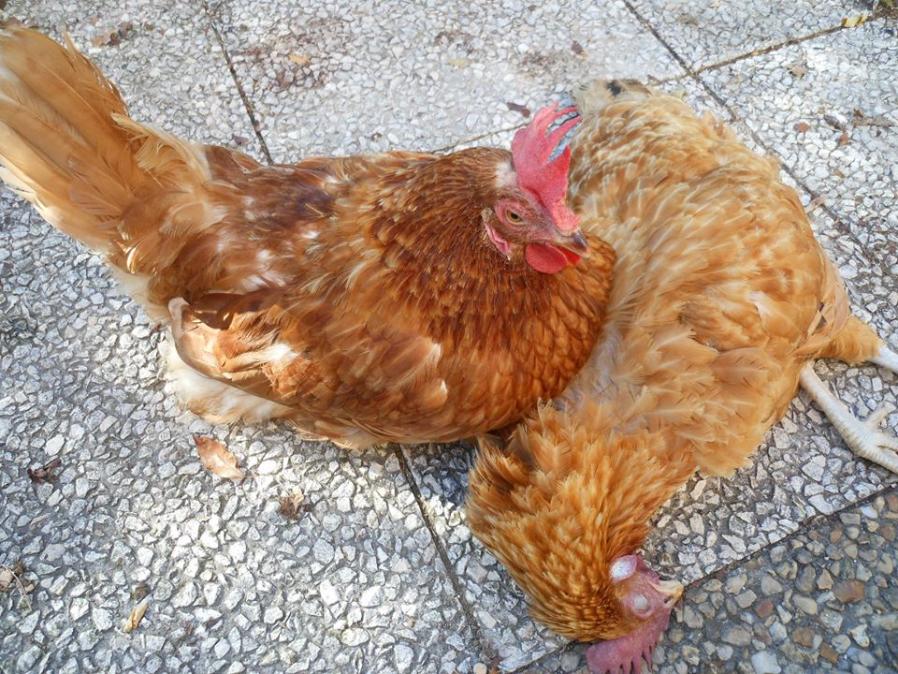
Europa saying goodbye to Aurélia
I conclude this story with a photo of Europa, then in perfect condition, saying goodbye to her pal, Aurélia. She sat beside her for a long time when Aurélia died. There is also a small video of it on Facebook. https://www.facebook.com/nala.bournezeau/videos/vb.100002135097263/1901938273220657/?type=3
"Think before you start" with keeping chickens. And if you already have chickens, don't hesitate to ask me things if you want to know something. I am always willing to help these animals, if I can. But for the real good care of illnesses, go to a vet anyway! Fortunately, science does not stand still.
Here is the website about our chickens with lots of chicken facts: http://www.fowlfaces.com/
France, 26 April 2019
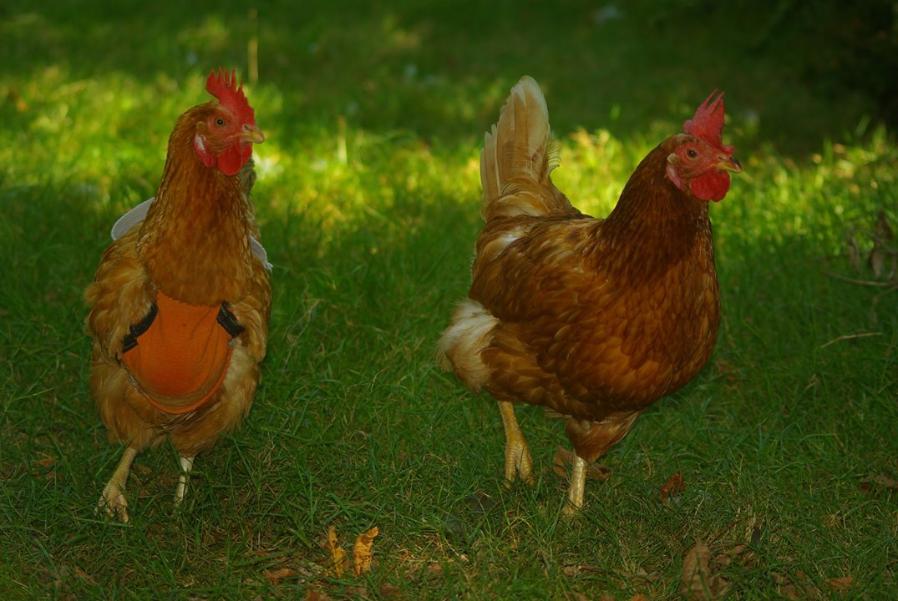
Europa and Aurélia, wearing a cropholder for her lame crop